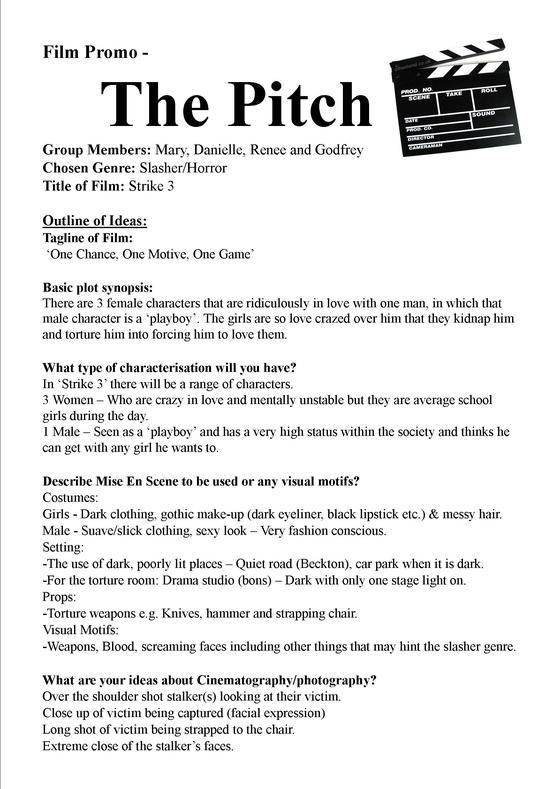The Long Pitch
There’s a lot more pressure to deal with during a long pitch as you need to articulate your ideas in detail, and if you’ve been asked to do a long pitch you are probably close to receiving some sort of deal.
It’s entirely appropriate to take notes or 3”x5” cards into a pitch although you want to make sure that you don’t just read directly from them. Commit the information to memory and use your notes as and aid if you feel you’ve forgotten something.
As with the two minute pitch you should open with your hook and then the storyline. You can introduce the main characters with a little detail about them before you go into the storyline if you wish. If you are giving a long pitch of one of your own ideas you might want to open with the title and genre too.
While this is the long pitch you aren’t expected, nor should you, give a scene-by-scene rundown of the story or mention every character in the story. Instead focus on the highpoints and most important characters. Give the executives information on the main characters, their goals, what’s at stake, the emotions, the theme, how the characters grow, any major plot twists and how the story will end.
 Avoid tying a character to a specific actor. If you say you see the main character being played by Tom Selleck then you’re painting yourself into a corner. The executives may have no wish to produce a film with Tom Selleck as the lead or Selleck may have no interest in playing the part. If you want to create a visual image of a character name several actors – “A Tom Selleck/Burt Reynolds/Harrison Ford style of actor”. This way you leave the door open for many actors to play the part in the mind of the executive.
Avoid tying a character to a specific actor. If you say you see the main character being played by Tom Selleck then you’re painting yourself into a corner. The executives may have no wish to produce a film with Tom Selleck as the lead or Selleck may have no interest in playing the part. If you want to create a visual image of a character name several actors – “A Tom Selleck/Burt Reynolds/Harrison Ford style of actor”. This way you leave the door open for many actors to play the part in the mind of the executive.
In a similar vein in can also be helpful to compare your idea to a past successful movie to help the executive visualise the project. “It’s like Chinatown meets Ghostbusters” gives an instant impression with very little thought.
During the course of the pitch you may be interrupted with questions and queries, this is why notes and cards are useful so you don’t lose track of where you were. This could also be a situation where you have to think on your feet if the executive suggests a change or two to the story. If you can implement new ideas quickly this will impress them greatly.
What Are They Looking For?
Outside of your ideas the executives are also testing you on your personality and your creativity. If they are to offer you a contract then that may mean many hours of time spent together. They are especially looking at four qualities, your SAGE.
Sensitivity – You need a thick skin to work in Hollywood, if you can’t take constructive criticism they you won’t be able to make it as a scriptwriter. You have to be able to separate your ego from your work. At the same time though you should stick to your guns on any issues you feel strongly about. It’s a fine balancing act.
Ambition – The more ambition the better. If the executives see you as someone who wants to write a series of blockbusters then they know you could be worth a lot of money to them if you have the ability.
Grace – No-one likes a pessimistic grump. You don’t need to be sugar and spice but treat people with respect and have good manners. Try to be a conversationalist no matter how nervous you might feel, you’ll soon warm into it.
Enthusiasm – Any good salesperson knows that the most important attribute to have is a passion for the product they are selling. Well, you’re selling your screenplay/ideas so this is no different. A strong sense of self-belief will impress the executives and help make them believe in you.
Good Preparation
The best way to cope with the high pressure situation of a long pitch is to prepare yourself well. Treat it like a job interview. Map out a route and have a look around a few days before the meeting so you won’t be flustered on the day. Pick out some nice clothes and get as good a night’s sleep as you can.
You should try and find out as much as possible about the company and people you are meeting with as possible. If you have an agent they will be able to do the work for you here. You want to find out what sort of genres they work in, what their budget stretches to, do they have any “go-to” star talent, etc.
It’s handy to take some sort of bag or case to the meeting where you can keep your notes and cards. You can also carry anything else you think they might ask for such as examples of work, samples scripts they haven’t seen and so on. A short biography of yourself as a scriptwriter could also be helpful if they ask about your background, keep it as reference rather than handing it to them though.
Some executives will ask you if you had any casting in mind for your script. Generally you want to keep this to the main character unless you have a strong image of a specific actor for a smaller role.
Arrive early to the meeting, you may be sat at reception for awhile but this will give you a chance to go over your notes and gather your thoughts.
The best possible preparation you can do though is to practice your long pitch as many times as possible. Pitch to the mirror, to friend, to relatives, to anyone! Practice makes perfect after all. You’ll soon find after a few runs through that you develop a certain flow
If you do well then it’s time to talk deal!
Please CLICK HERE To Check Out My Top 5 Online Scriptwriting Courses


